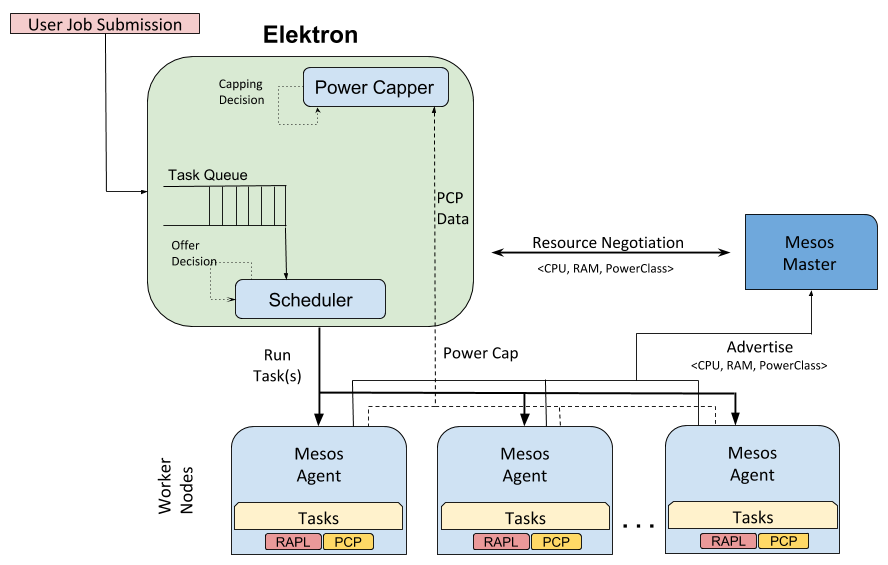Added condition to mandate high and low thresholds only for extrema and progressive extrema power capping strategies. |
||
|---|---|---|
| constants | ||
| def | ||
| docs | ||
| environment | ||
| logging | ||
| pcp | ||
| powerCap | ||
| rapl | ||
| schedulers | ||
| scripts | ||
| utilities | ||
| vendor | ||
| .gitignore | ||
| config | ||
| Gopkg.lock | ||
| Gopkg.toml | ||
| README.md | ||
| schedPolConfig.json | ||
| scheduler.go | ||
| workload_sample.json | ||
Elektron: A Pluggable Mesos framework with power-aware capabilities
Elektron is a Mesos framework that behaves as a playground for developers to experiment with different scheduling policies to schedule ad-hoc jobs in docker containers. It is designed as a lightweight, configurable framework, which can be used in conjunction with built-in power-capping policies to reduce the peak power and/or energy usage of co-scheduled tasks.
However, in addition to being a scheduler, Elektron also takes advantage of tools such as Performance Co-Pilot and RAPL to help contain the power envelope within defined thresholds, reduce peak power consumption, and also reduce total energy consumption. Elektron is able to leverage the Mesos-provided resource abstraction to allow different algorithms to decide how to consume resource offers made by a Mesos Master.
Architecture
Elektron is comprised of three main components: Task Queue, Scheduler and Power Capper.
- Task Queue - Maintains tasks that are yet to be scheduled.
- Scheduler - Matches tasks' resource requirements with Mesos resource offers. Tasks that matched offers are then launched on the corresponding nodes.
- Power Capper - The Power Capper monitors the power consumption of the nodes in the cluster through the use of Performance Co-Pilot. A power capping policy uses this information and decides to power cap or power uncap one or more nodes in the cluster using RAPL.
Usage
Logging
Please go through the logging library doc to understand how the logging library has been setup. There are also instructions on how one can add additional loggers.
Data
- Cluster Resource Consumption
- Schedule Trace
- Degree of Collocation
- When scheduling policy switching enabled.
Software Requirements
Requires Performance Co-Pilot tool pmdumptext to be installed on the machine on which electron is launched for logging to work and PCP collector agents installed on the Mesos Agents
Compatible with the following versions:
- Mesos 1.5.0
- Go 1.9.7
Build and Run
Compile the source code using the go build tool as shown below.
go build -o elektron
How to run (Use the --help option to get information about other command-line options):
Use the -logPrefix option to provide the prefix for the log file names.
./elektron -master <host:port> -workload <workload json>
Power Capping
Elektron is also capable of running power capping policies along with scheduling policies.
Use the -powercap option with the name of the power capping policy to be run.
./elektron -master <host:port> -workload <workload json> -powercap <powercap policy name>
Plug-in Scheduling Policy
Use the -schedPolicy option with the name of the scheduling policy to be deployed.
The default scheduling policy is First Fit.
./elektron -master <host:port> -workload <workload json> -schedPolicy <scheduling policy name>
Note: To obtain the list of possible scheduling policy names, use the -listSchedPolicies option.
To run electron with Scheduling Policy Switching Enabled, run the following command,
./elektron -master <host:port> -workload <workload json> -ssp -spConfig <schedPolicy config file>
Workload schema:
[
{
"name": "minife",
"cpu": 3.0,
"ram": 4096,
"watts": 63.141,
"class_to_watts": {
"A": 93.062,
"B": 65.552,
"C": 57.897,
"D": 60.729
},
"image": "rdelvalle/minife:electron1",
"cmd": "cd src && mpirun -np 3 miniFE.x -nx 100 -ny 100 -nz 100",
"inst": 10
},
{
"name": "dgemm",
"cpu": 3.0,
"ram": 32,
"watts": 85.903,
"class_to_watts": {
"A": 114.789,
"B": 89.133,
"C": 82.672,
"D": 81.944
},
"image": "rdelvalle/dgemm:electron1",
"cmd": "/./mt-dgemm 1024",
"inst": 10
}
]
